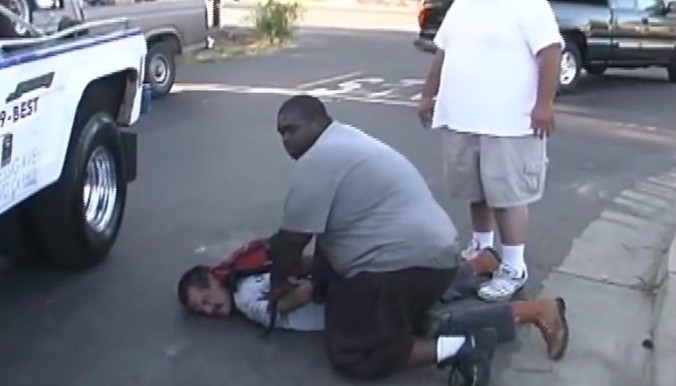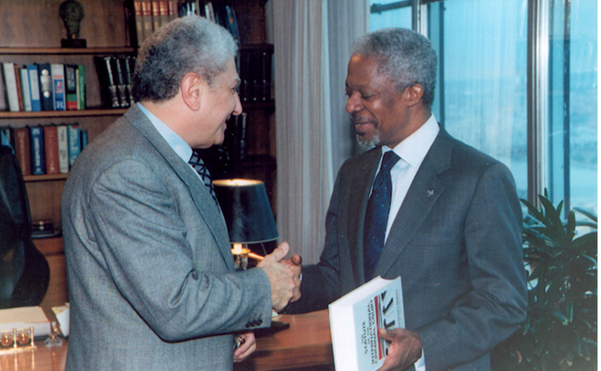
by Mary W Maxwell
In 1977 Cherif Bassiouni, a law professor at DePaul University, published Citizen’s Arrest. For decades it was the only book on that topic, as far as I know. I will outline his theme below. I have re-iterated it in several of my books. Long story short: it is legal in the US to perform a citizen’s arrest. Same for Australia, as it is based on the common law.
Sorry to say, Cherif Bassiouni died last year at age 79. His website (which he says he got “dragged into” making, by law students) starts with a quote from the Holy Koran:
Indeed, We [Allah] honoured the progeny of Adam, and bore them across land and sea and provided them with good things for their sustenance. — Surat 17:70.

Bassiouni did not stay in the field of citizen’s arrest. He specialized in human rights and international criminal law. I believe he influenced the Rome Treaty that led to the establishment of the International Criminal Court.
Very likely the professor has many disciples in that area, but has anyone persisted with the citizen’s arrest theme?
I have not found such a person and I suspect there are two reasons for this:
- The original common law is so well-conceived that a scholar can’t do much to improve on it.
- The subject of holding government officers accountable for their crimes (a subject dear to us here at GumsheNews.com) is considered unpleasant in academic circles, so there hasn’t been any expansion on that.
A trek through Google Scholar under the heading “citizen’s arrest” does yield many articles from law journals. But these tend to be on specific problems, for example: Can citizen’s arrest be used at the Mexican border to refuse illegal entry? Can a victim of domestic violence sign a “citizen’s arrest form” at the request of police, to overcome his restriction on making a warrantless arrest? (In California that is called “delegated citizen’s arrest” – the citizen delegates her powers to a cop.)
The Original Law As Stated By a NSW Judge in 17854
The following is a quick summary of the relevant part of the law of England, which we inherited via the common law. This is a quote from Chief Justice Burton of New South Wales, in his ruling for the Court in R. v. Elliot. The judgement was given on 18 February, 1854 and reported in the Sydney Herald on 20 February, 1854 – with my bolding:
“The Law of England makes every man an officer to arrest a Traitor or Felon, and all persons of Competent Age, who are present where treason or felony is committed or a dangerous wound is given, are bound to apprehend the Offender on pain of being fined and imprisoned for their neglect; they are also bound to raise Hue and Cry, and pursue him; and every private person is bound to assist an officer demanding his help for the taking of a Felon suppressing an affray or apprehending the affrayers.
In such cases they are under the same protection of the Law as Officers of Justice; if they are resisted and killed, it is Murder in the party resisting and Slaying; if the Offender flees and cannot be otherwise apprehended, and is killed, it is in them Justifiable Homicide, but in all these cases it is essential that a Felony should have been committed, or that a Hue and Cry has been raised.
Private persons are also permitted by Law (but not enjoined) to arrest without Warrant, upon sufficient causes of suspicion of Treason or Felony, but in such cases if an innocent person has been arrested, and it be proved that no Treason or Felony has been committed, the party arresting or causing the arrest does so upon his own responsibility….”
Note: That case, R v Elliot, ended with a statement that you cannot arrest someone you suspect of being a transportee at large, as that is a misdemeanor, not a felony. But don’t worry about that as we don’t have any more transported convicts around. (But did you see my 2018 Adelaide Fringe show on MK-Ultra? Or Dee McLachlan’s movie “The Jammed” about trafficking in Melbourne?)
In any case, be aware that the crime you are making a citizen’s arrest for must be a felony (a crime with a prison sentence) not just a lowly misdemeanour.
Port Arthur
Yesterday (April 2, 2018) at GumshoeNews.com, the editor, Dee McLachlan made a startling remark. She said, in the Comments section:
“Start by citizen-arresting everyone that maybe complicit in the Port Arthur Psy-op. If the activist gets arrested and finds him/herself in court, then the PA evidence begins to surface. If 5 citizens arrest one person, and this is duplicated 20 times, this could be “embarrassing” for the government. Another embarrassment for [ex-prime minster] John Howard.”
Dee and I are co-authors of the book Port Arthur: Enough Is Enough. Most Gumshoe readers are aware that the patsy who is in prison for committing the Port Arthur massacre in Tasmania in1996, Martin Bryant, is definitely innocent. But somebody did commit the massacre.
In 1996, many residents of Tasmania were aware of the thinness of the evidence against Bryant and were alert to the anomalies in the case, but they could not get the police to look around for any other suspects.
You may pardon the authors of Port Arthur: Enough Is Enough for thinking that the reason police won’t get involved in naming suspects for the massacre is that they themselves are the most likely suspects.
Distinction from Self-Defense
If someone is hurting you, or hurting another person, you can take defensive action. Say he raises a baseball bat with clear intention to smash your head. You can do whatever is necessary to prevent that, including killing him.
My article today is not about self-defense. I want to just state how clear the law is on self-defense, as it does come into one aspect of citizen’s arrest. It is a completely natural law – one can’t very well tell a person to refrain from protecting his own life.
The High Court of Australia ruled in 1987 in the case of Zecevic v DPP:
“The question to be asked in the end is simple. It is whether the accused believed upon reasonable grounds that it was necessary in self-defence to do what he did. If he had that belief and there were reasonable grounds for it, or if the jury is left in reasonable doubt about the matter, then he is entitled to an acquittal.”
However, that’s not the law that particularly applies to the matter of citizen’s arrest.
What Is an Arrest?
The verb to arrest mean simply to stop. “The antibiotics arrested the spread of the rash.” In regard to police-type arrest, the thesaurus offers such synonyms as:
To collar, capture, bag, nail, nick, grab, retain, hook, bust, or pickle. The thesaurus also provides “to sequester” as a synonym.
I think an amateur doing a citizen’s arrest should envision both a stoppage and a sequestering.
By stoppage I mean that you have to try to stop him from doing what he is about to do. But, if he has already completed the crime, the stopping is merely the type of stopping that happens when a cop comes up to you to question you, or asks a driver to pull over. If he is running away or driving away you have not succeeded in arresting him.
As for the sequestering, this is your problem to deal with until the authorities arrive. You have to keep him in your custody.
Let us remember that this whole thing has to do with conforming to the law of the land. The criminal has broken the law. He needs to be brought to book. The typical way is for our paid policepersons to observe activity in the community and actually capture someone in flagrante delicto, or else act on information received.
The cop has all that is needed by way of weaponry to subdue a person. Anyway, in most instances all it takes is for him to flash the badge — the person will cooperate.
According to Cherf Bassiouni’s 1977 book, the 50 states have varying details about the carrying out of a citizen’s arrest so he has called for a uniform law. (The US does not have uniform law for all states of course; he means a model law that they could adopt.)
In his proposed model law, Bassiouni asks that the arrestor be required to tell the arrestee her proposed action and state the reasons. Example:
“Mr Smith I am arresting you, as a citizen’s arrest, for shooting a customer at the Broad Arrow Café in Port Arthur on April 28, 1996.”
Bassiouni also says it should be the responsibility of the citizen arrestor to “do the Miranda’s”: “Mr Smith, You do not have to say anything but anything you do say may be used in court against you.” Per Bassiouni:
“The arrestor may in effectuating the arrest use any reasonable amount of force necessary and warranted under the circumstance other than deadly force and force causing great bodily harm, but without prejudice to ‘self-defence.’.”
As you may have guessed, that last part means “This wording does not ‘prejudice’ – does not rule out or infringe – the usual law of self-defense.” Thus, even if you are arresting someone for a cold crime, rather than one the miscreant is presently engaging in, and he resists arrest to such an extent that he is about to harm you greatly, your “Zecevic rights” kick in.
To be cautious, Bassiouni also wanted the model law to say:
“The arrestee shall not resist the arrest unless he knows it to be unlawful. This shall not, however, prejudice the arrestee’s right to ‘self-defence’ in preventing any unauthorized harm from occurring to him or her.” [and]
“An arrestor must upon performing the arrest notify a peace officer and deliver the arrestee … without delay.”
I recommend that you have the sequestering factor well-organized in advance. What are you going to do if the police refer to deal? I recommend you put the captive in a place that is not uncomfortable or humiliating. I realize the very thought of this is peculiar and off-putting. We are pioneering here.
Who is Immune from Capture?
In Australia the only person immune form arrest is the monarch. Since the queen only rarely visits Australia the matter should never arise, but let’s be clear: Her Majesty is legally, legitimately protected from arrest.
In the United States, the Constitution specifically says that Congresspersons may not be arrested on their way to or from a session of the legislature. The purpose of that was to prevent their political enemies from keeping them away from Congress on an important vote. (Did I ever tell you, the Constitution is top job when it comes to finding antidotes for moral hazard?)
When it comes to keeping your mitts off of prominent persons I can only say why pick the most controversial for arrest when there are so many eligible? Use a modicum of diplomacy or this whole thing will scare the public out of their wits.
By the way, in his proposed law, Bassiouni recommends as follows:
“The following categories are immune from citizen’s arrest: a. law enforcement agents (local, state, federal) b. members of the judiciary c. members of the legislature.”
Please note: he was trying to make his new law acceptable to a broad public. His words did not become law.
Massachusetts Law in Effect Today
Besides the common law of citizen’s arrest, many states have enacted statutes in this area. The following was very likely written for the benefit of store owners who hire security personnel to prevent shop-lifting. When such security guards – uniformed or plain-clothed – arrest you, they are making a citizen’s arrest.
In Massachusetts law, Chapter 231, Section 94B. we see that the emphasis is on providing the arrestor with a defense of he is accused of having done wrong to the arrestee.
I retrieved this from the website MAlegislature.gov under the heading“False arrest; shoplifting; defrauding innkeepers; defenses”:
“In an action for false arrest or false imprisonment brought by any person by reason of having been detained for questioning on or in the immediate vicinity of the premises of a merchant or an innkeeper, if such person was detained in a reasonable manner and for not more than a reasonable length of time …
and if there were reasonable grounds to believe that the person so detained was committing or attempting to commit a violation of section thirty [etc] or attempting to commit larceny of goods for sale on such premises [etc] it shall be a defense to such action.” [Emphasis added]
That is (I interpret): if you meet the requirements, such as a reasonable manner of holding him, and he sues you, a Massachusetts judge will not award damages to him.
Over to you, Tasmania.
— Mary W Maxwell invites everyone to download our Port Arthur book. Search this website for ‘books’ and it will jump out at you.






























Thanks for this article M M
You started it, YB.
Thank you for this information Mary. If I understand to make a citizen arrest the person that you want to arrest is one that is about to commit or has just committed a crime.
In the case of the USA v. Tsarnaev, from what I understand, we can no longer make a citizen’s arrest.
Can the law be interpreted as ‘when you become aware that a crime as been committed’ you can still make a citizen’s arrest?
Invalid etc; screenshot commentsent.
Mary: boring!
read the screenshot sent2u
re Ned.
Hmm. Ned has emailed me a screenshot of his typing. I think this means he tried to send it to Gumsville and was blocked. Ned has even less techie skill than I do if that is humanly possible.
I think the gist of it is that Ned once tried to catch a thief on the spot as it were, and then the guy went off and got bloodied elsewhere which could have put poor old non-techie Ned in trouble.
How’m I doin’ Ned. But if this happens sometimes it may not happen every time.
For example Carleen cold probably arrest Rick successfully today. I mean Rick the hostage.
Are we all on the same page here?
This is Ned’s citizen arrest story screen shot link here
https://gumshoenews.com/wp-content/uploads/2018/04/IMG_0233.jpg
Well, Josée, if you read what the judge said in 1854 that would be the real theme — that we are obliged to carry out the enforcement of the law. The fact that in 1820 London started to let Sir Robert Peel build an organized police force is not the big event. There is no big event in policing. It’s just us chickens, century after century. Luckily, there are kazillions of us and we gotta make sure the important job gets done.
In the case of Port Arthur, it is clear that nothing is in the works to resolve the mystery of the gunman at Broad Arrow, or the arsonist at Seascape. Any schoolboy can tell you who did it, so the issue is the stumbling block of there being a Peel force. It confuses people.
Well, I’m not confused. I know a miscreant when I see one. The Hobart miscreants assume they will always be left untouched. Martin Bryant, however, gets on people’s nerves, as Jahar gets on yours.
Thank you, Martin. Thank you, Jahar. Things are lookin’ up and Ms Lepine is one of the main reasons.
There, Josée, put that in your pipe and smoke it.
Continuing the reply to Josée. Two maxims of law:
Breve judiciale non cadit pro defectu formae — We don’t throw away a judicial achievement because it was written on the wrong form.
Ratio legis est anima legis — The reasoning behind the law (or simply the reason why the law exists, says the sociobiologist) is the life of the law.
Josée, you asked if we need worry about a technical point re the date of the crime. Ask God. God will say How could you even ask?
Anyway there isn’t any technical point – common law does not write the particulars the way a statute does. (I got too specific when I said “has just committed the crime.”)
Common law is mainly ratio legis. If I say any more I’ll spoil it.
Ding!
This is a really hot song. You could sing it while making the arrest:
Dies iræ, dies illa, Solvet sæclum in favilla, Teste David cum Sibylla! Quantus tremor est futurus, quando iudex est venturus, cuncta stricte discussurus! … Mors stupebit et Natura, cum resurget creatura, iudicanti responsura. Liber scriptus proferetur, in quo totum continetur, unde Mundus iudicetur. Iudex ergo cum sedebit, quidquid latet apparebit, nihil inultum remanebit. Quid sum miser tunc dicturus? Quem patronum rogaturus, cum vix iustus sit securus? Rex tremendæ maiestatis, qui salvandos salvas gratis, salva me, fons pietatis.
Thanks to a friend for telling me a. minute ago that a man in Adelaide did a citizen arrest today, re pedophilia. Here is the link with a video of it:
https://www.9news.com.au/national/2017/12/14/19/25/adelaide-pedophile-hunter-stages-citizens-arrest
And “Sir Robert Peel” was not too pleased and it appears the arrestor is now facing charges.
https://au.news.yahoo.com/sa/a/38389557/sa-police-turn-tables-on-self-confessed-pedophile-hunter/
Imagine, all this activity in ADELAIDE!
Mary, this is fascinating.
“The police will prosecute anyone who takes the law into their own hands… pass the information on to the police.” Wow. Citizens arrest not allowed.
I’d suggest you pass your information on on Damian Bugg et al to the police immediately — at the police station.
It is my (perhaps faulty) understanding that Common Law was declared ultra vires or otherwise invalid/unenforceable by the Judicial Amendment Act of 1988(?). (I have never had the time or opportunity to study the Act).
Since then, citizens making a citizens arrest, or even engaging in self-defense, have faced police prosecution and imprisonment.
For example, in Queensland, a frail age pensioner, fearing for his life, shot a home invader and was imprisoned.
In a hinterland Sunshine Coast incident, a group of people being threatened with what looked like gang violence were observed by a passing motorist, who drove his ute between the two as an intervention measure. As I recall, he did a year in prison. The gang got nothing.
Another case… my 16 year old daughter refused to return from a visit to her boyfriend, 3 thousand Ks away. The police told me I would be arrested for abduction if I attempted to bring her home. Thus, even a parent attempting to protect his child from typical teenage immaturity, is guilty of a criminal offence.
Ironically, I was a former welfare officer for the Commonwealth and NT Governments for ten years.
My conclusion is that various social scientists and activist judges, backed by the United Nations, successfully campaigned to eliminate parenting and self-defense from statute protection. The first move was to scrap teachers training colleges and then inculcate university trained students, who were destined to never leave school and live in the real world, to sever the intergenerational transfer of values.
We all observed the outcome as children reporting their parents to welfare for the crime of disciplining and guiding their children.
Being a hopelessly romantic and incurable optimist, I cherish the day when I get to slam the prison doors on the sociopaths who made protection of the weak and helpless, a crime.
Tony, the home invasion thing was self-defense. Has nothing to do with citizen’s arrest.
‘it appears the arrestor is now facing charges’ – That is the real problem. People don’t act because of the reprisals. They see a child being molested and they say noting, we see something wrong with the Tsarnaev case and we are scared to do anything (except you Mary who was brave enough recently in Watertown).
Perhaps our efforts should go towards changing the laws in the US so that people can act when it is necessary.
I am waiting to find out what the charges are. Can’t think of any based on what has been reported thus far. See my April 4 article on this and on stings.
Josee, I was not brave. Maybe I am deluded but I think the law is big and strong and I can cling to it.
Time will tell.
https://gumshoenews.com/2018/03/04/all-gall-is-divided-into-three-parts-watertowns-open-mic-session-on-the-tsarnaev-case/
Certain things you might be able to do in the US would almost certainly put you behind bars in Aus. And vice versa of course. The similarities between the two Countries are only superficial.
And as for setting anyone else free, the very best you can do is to point in the direction of the available tools.
Because interfering with personal choice will do nothing but compound the perceived problem
A link to some discussion on self-defense:
http://www.lawbuddy.com.au/self-defence.